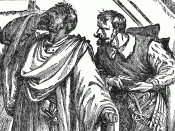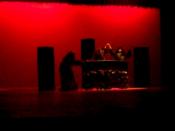In this tragic play Macbeth, by William Shakespeare we experience a main character that seems to take on the role of evil once again. The question is does Macbeth's evil equal that of Iago's in the previous work, Othello. It seems that this can be a reasonable assumption due to Macbeth's filthy deeds, but as the witches said "Fair is foul and foul is fair."ÃÂ(I, i, 10) Nothing is as it seems or at least in Shakespeare's writings anyway.
It is true that for the majority of the book Macbeth's evil does equal Iago's and occasionally surpass' it with his mini killing sprees. However the beginning of the stories is where the two differ from each other. The main difference is Iago never had any other thought besides his evil plots against everyone. "I follow him to serve my turn upon him,"ÃÂ (I, i, 39) Iago commented about Othello waiting until the time was right to begin to pour the poison in the moor's ear.
This took place on the third page of the play. Iago's intentions were pure evil from the beginning. He knew his plan; he executed and never looked back straight through to the end. Iago put on a new face for every person he saw. He lied, cheated, and stole to make his plan work and in the end he left a wicked wreckage behind. Never once did Iago feel a bit of remorse. Yes, Macbeth did end up like Iago, but he fought his evil thought in the beginning because he knew they were genuinely wrong.
The three witches confront him in the beginning of the story with the great fortune his future holds. The thought of corruption then enters his mind, but he does not turn to the dark side that quickly. He plays with these thoughts for a while going back and forth like a seesaw. First he says "If chance will have me king, why, chance may crown me, without my stir."ÃÂ(I, iii, 144) He is not so eager to speed up the process of these changes yet. Then he says "The Prince of Cumberland! That is a step on which I must o' erleap, for in my way it lies. Stars, hide your fires: let not light see my black and deep desires: The eye wink at the hand; yet let that be which the eye fears, when it is done, to see."ÃÂ(I, v, 50) He is still not sure on what he should do. Macbeth sends a letter home to his wife telling her of the prophecy he was told. Once she hears word of their opportunity she wants to take advantage of it. Later on in this scene he returns home and greets his wife. Immediately she begins talking about their plans for the king. "Look like th' innocent flower, but be the serpent under "ÃÂt."ÃÂ(I, v, 66-68) She devilishly exclaims to her husband explaining how they shall act around the king upon his arrival. All Macbeth can conjure up to say is "We will speak further."ÃÂ Macbeth is still trying to not be tempted by his evil thoughts. Macbeth displays his concerns more deeply to us in a soliloquy in act 7, scene one, lines 1-28 (pgs.20-21) He then expresses to his wife that he does not want to go through with the plan to kill the king. "We will proceed no further in this business: he hath honored me of late, and I have bought golden opinions from all sorts of people, which would be worn now in their newest gloss, not cast aside so soon."ÃÂ(I, vii, 31-34) Macbeth shows he appreciates what Duncan has done for him. He then explains to her how so many people already respect him due to his noble acts he has done in battle. Upon hearing this Lady Macbeth responds insulting her husbands "manhood"ÃÂ, "Was hope drunk wherein you dressed yourself? Hath it slept since? And wakes it now, to look so green and pale at what it did so freely? From this time such I account thy love. Art though afeard to be the same to thine own act and valor as thou art in desire? Wouldst thou have that which thou esteem' st the ornament of life, and live a coward in thine own esteem, letting "I dare not"ÃÂ wait upon "I would,"ÃÂ like the poor cat I' th' adage?"ÃÂ(I, vii, 35-44). Macbeth pleads his case and says, "I dare do all that becomes a man; who dares do more is none."ÃÂ Lady Macbeth will not be denied and continues to add fuel to the fire by saying "You would be so much more than a man"ÃÂ if he becomes king. Macbeth knowing what he is about to do is wrong ends the first act by saying "Away and mock the time with fairest show: False face must hide what he false heart doth know"ÃÂ From this point on Macbeth becomes pure evil just as Iago. He lies, cheats, and steals to obtain what he wants. Macbeth is not the normal tragic hero Shakespeare places in his writings. He is a tragic figure because he never realizes his wrongdoings and never gains salvation for them. Macbeth started off as such a noble man an attribute Iago could only dream of. In the end all of Macbeth's goodness turned to evil.





